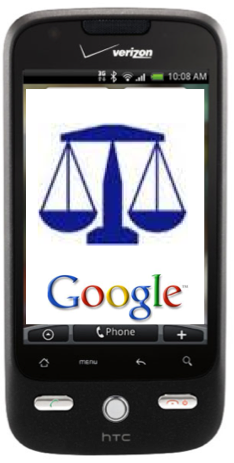Skyhook Case Giving Google PR Headache
Ultimately Google will probably prevail in the lawsuit that Skyhook Wireless filed last year, but not without taking a few hits along the way. In that action Skyhook claims Google interfered with its relationships with two hardware manufacturers, Motorola and “Company X” (Samsung). Both OEMs were reportedly committed to using Skyhook’s location-positioning system vs Google’s […]
 Ultimately Google will probably prevail in the lawsuit that Skyhook Wireless filed last year, but not without taking a few hits along the way. In that action Skyhook claims Google interfered with its relationships with two hardware manufacturers, Motorola and “Company X” (Samsung).
Ultimately Google will probably prevail in the lawsuit that Skyhook Wireless filed last year, but not without taking a few hits along the way. In that action Skyhook claims Google interfered with its relationships with two hardware manufacturers, Motorola and “Company X” (Samsung).
Both OEMs were reportedly committed to using Skyhook’s location-positioning system vs Google’s and Google later prevented both from doing so, according to the complaint. (There’s a related patent-infringement case, which is more technical and has been less widely discussed.)
Google: We Did Nothing Wrong
Google says it has done nothing improper in asserting that its location positioning be used instead of Skyhook’s on Android devices. To oversimplify, Google has advanced two main arguments in its defense.
The first is that Skyhook’s software XPS failed to meet certain technical “compatibility standards” with Android. The second, and legally more powerful, is that Google has a contractual right to prevent manufactures from distributing devices “under the Android trademark with any software installed that, in Google’s determination, would interfere with full functioning of Google’s applications, including retrieval of location data.” That’s according to language in the trial court’s recent denial of Google’s motion for summary judgment.
Skyhook’s Legal Challenge
To win the case, Skyhook will have to show that Google didn’t simply block Samsung and Motorola from using the company’s software but did so for the improper purpose of trying to harm the Boston-based company. That will be extremely difficult if not impossible for Skyhook to show, absent an email saying something like “these guys are a big threat” or “we gotta crush them.”
As discovery has progressed there has been an increasing amount written about Google internal correspondence over Skyhook. So far there are no “smoking guns,” such as the above, but there’s much that creates a kind of PR headache for Google. Each discussion of the case hurts Google’s image and suggests its rhetoric about Android “openness” is hypocritical.
Google Trying to Finesse “Openness”
Android boss Andy Rubin tried to tackle what he believes is “confusion” over open source vs. community software development at Google I/O. Google sees itself as the steward of Android and wants to ensure its success. It has characterized its moves as beneficial for the OS and the ecosystem. There’s truth there but Android and Google are inextricably linked; Google sees Android’s success as synonymous with its own success in mobile.
The PR story surrounding Android is about its “openness” — the idea that Google doesn’t dictate terms to developers, that anyone can use Android and so on. However the revelations in the Skyhook case show that Google is much more than a first among equals. It’s the gatekeeper and the system is not as open as Google would like to portray.
Reality Doesn’t Quite Match Rhetoric
Rubin and Google argue this is about quality. But Google can’t have it both ways: we’re not like Apple and we get to veto third party use of alternatives to our tools.
Google has used the “openness” argument repeatedly with developers to contrast itself and Apple’s “Orwellian” top-down approach. Against Microsoft Google has used the absence of licensing fees as one way to woo OEMs to the platform. For the most part it has been extremely successful; Android may become the top smartphone OS in the world early next year.
It’s not clear yet whether the Skyhook case will create further regulatory or legal problems for Google in the US and Europe. Antitrust investigations are underway in both jurisdictions, although the US investigation has yet to really kick in. So far most of the focus is on search on the PC.
However the Goliath v. David story that Skyhook represents could find its way into the US investigation as lawyers look at the increasingly important mobile market.
Postscript: I received an email from Skyhook Wireless CEO Ted Morgan, who disputes my assessment that Google will “probably prevail.” Morgan pointed out that discovery hasn’t really even begun in the case.
Contributing authors are invited to create content for Search Engine Land and are chosen for their expertise and contribution to the search community. Our contributors work under the oversight of the editorial staff and contributions are checked for quality and relevance to our readers. The opinions they express are their own.
Related stories